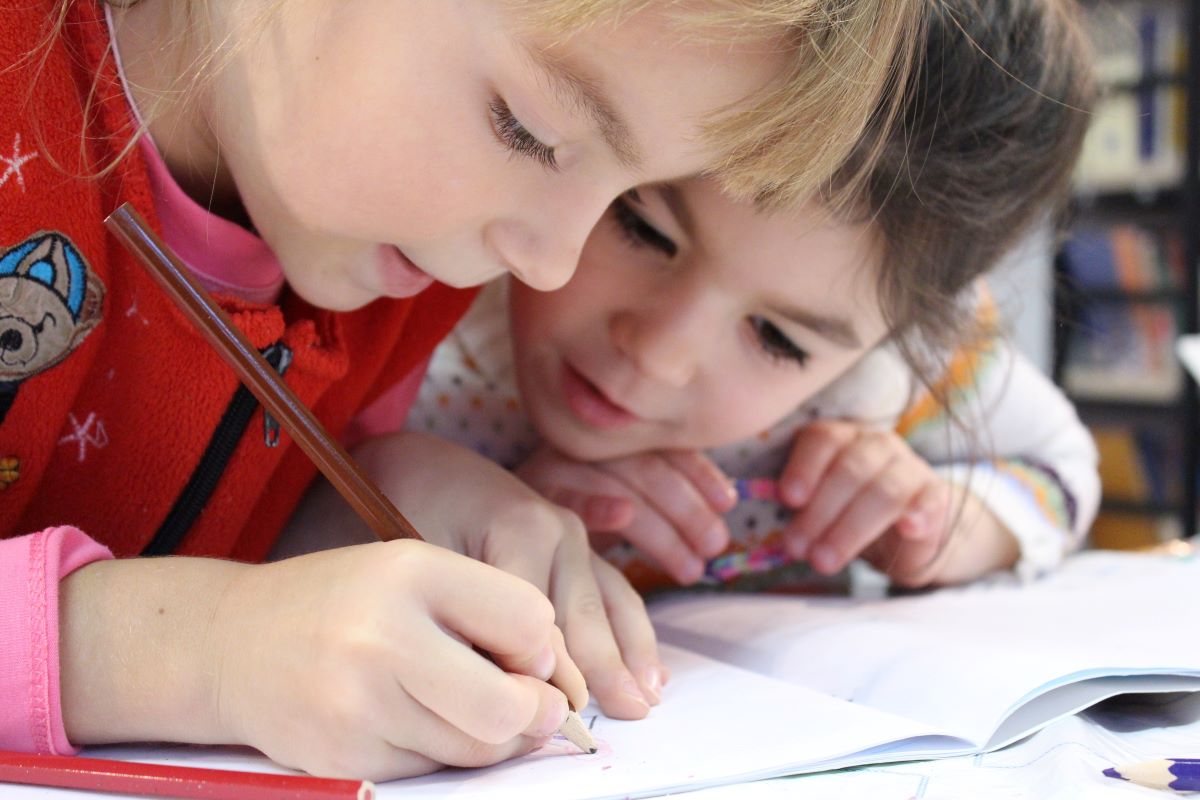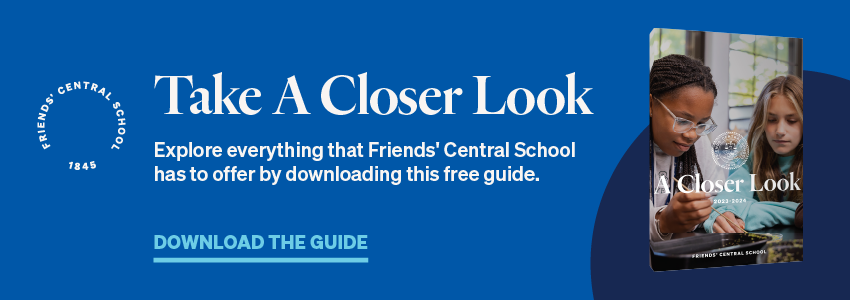
“The mind that opens to a new idea never returns to its original size,” Albert Einstein.
In the search for a quality school and education for their young learner, parents and guardians may wonder what they can do at home to support their child’s intellectual and emotional growth. Fortunately, children are born with many of the elements that help make them enthusiastic lifelong learners—the grownups in their lives need only encourage them.
The most important element is the innate sense of curiosity that children are born with. It is this curiosity that drives young learners to explore the world around them, ask questions, and seek out knowledge in an active and engaged way.
Free Downloadable Guide: Take a Closer Look at Friends' Central School
With curiosity as an integral ingredient of a lifelong love of learning, parents should look to the many ways they can help strengthen and encourage the natural sense of curiosity in their child.
The Importance of Curiosity in Childhood
So much of what children do from an early age is driven by curiosity. From babies staring into caregivers’ eyes, to toddlers crawling, running, and grabbing everything in sight, to the seemingly endless stream of questions posed by little ones, children spend each and every day exploring the world around them. In fact many parents may find they need to do very little to promote curiosity in their children. Rather, the key is encouraging it–even if it is exhausting at times. Why? Because curiosity is the heart of successful, lifelong learners.
“When children become curious, the brain becomes a fast moving, information gathering tool that encourages learning,” according to experts at the Michigan State University Extension. This curiosity drives children’s intellectual and emotional growth, allowing them to navigate new experiences and expand their knowledge.
Knowing this, parents, guardians, and caregivers should encourage children to ask questions, explore the world around them, and seek out new experiences. Children who are empowered to do so stay engaged and find enjoyment and enthusiasm from learning new things that will make them successful in school and beyond. Fortunately, there are many rich and organic ways families can stoke the embers of curiosity and foster an inquisitive environment at home.
Encouraging Curiosity
Parents should remember that in many ways, they are their child’s first teacher. The habits and environment they cultivate can set the stage for successful, engaged learners long before their child sets foot inside their first school. It is therefore the job of parents and caregivers to give children opportunities to explore and express their curiosity and give them the courage and agency to ask questions and test out new ideas.
1. Be Curious Together
One of the easiest ways to encourage curiosity in your child is to be curious with them. And living with curiosity is easier than you might think! Plan everyday activities for your family that encourage investigation and help little ones expand their minds and horizons to new concepts and environments. Some examples might include:
- Taking family trips to the zoo
- Taking nature walks and hikes
- Cooking dinner together or pick out new baking recipes to try
- Traveling to new states and countries
- Exploring museums and galleries
- Attending performances and shows from a variety of genres and artists
Be sure to talk about what you’re observing with your children, encouraging them to make connections with these new experiences and the ones they already know.
2. Provide Opportunities For Exploration
Allowing children the freedom to explore on their own is an incredible way to activate their curiosity in a productive way. Unstructured, or “free” play, is a great way to naturally provide opportunities for exploration.
Parents and caregivers should step back a bit and give their child the freedom to see where their “free” play takes them. Allowing time for this unstructured exploration ultimately allows children to “practice” using their imagination and follow their curiosity—free from the roadblocks or restrictions of adult thinking.
Alison Gopnik, professor of psychology at UC Berkeley and author of The Gardener and the Carpenter: What the New Science of Child Development Tells Us About the Relationship Between Parents and Children explains that “our job is not to shape our children’s minds; it’s to let those minds explore all the possibilities that the world allows. Our job is not to tell children how to play; it’s to give them the toys and pick the toys up again after the kids are done. We can’t make children learn, but we can let them learn.”
Parents should keep this in mind and remind themselves that ultimately, their job is to foster their child’s curiosity, and give them the freedom and encouragement to explore where it takes them.
3. Encourage Questions
The secret to raising lifelong learners isn’t having all the answers. Rather, it’s empowering and enabling children to ask “why” in the first place.
To do this, adults should embrace the unpredictability of their everyday explorations with children. Consider approaching things like sudden rainstorms, unexpected animal appearances, and unusual everyday finds with an open, active, and curious mind, rather than passively. Discussing what you’re seeing with your child and asking them questions—like “why do you think we’re seeing so many falling leaves?” or “I wonder why that tree looks like that?”—allows them to engage their curiosity in a thoughtful way, think critically about what they’re seeing, and make connections they might not have otherwise made on their own. It also models the question-asking behaviors that will help them become active, engaged learners.
Curious Children are Lifelong Learners
At the end of the day, parents, guardians, and caregivers who nurture and encourage children’s natural sense of curiosity find that they are raising active, engaged learners who delight in the explorative journey as much as the end result. Curious minds find a joy in information that ensures they learn, retain, and, in many cases, continually expand upon their knowledge.
Parents and guardians can also consider enrolling their children in schools like Friends’ Central School, that work hard to provide a culture and environment that cultivate this innate sense of curiosity and build on the work that has already started at home. Play-based programs like their innovative Nature Nursery, as well as their libraries and specialized classes allow for learning at the earliest stages to happen in natural, creative, and engaging environments that encourage the discovery and exploration that leads to enthusiastic, lifelong learners.
Ultimately, parents need to do very little to stoke the fires of curiosity in their young learners. Rather, they should be sure to continuously nurture and encourage the curiosity that already exists in them, knowing that a curious child is also an engaged learner.



